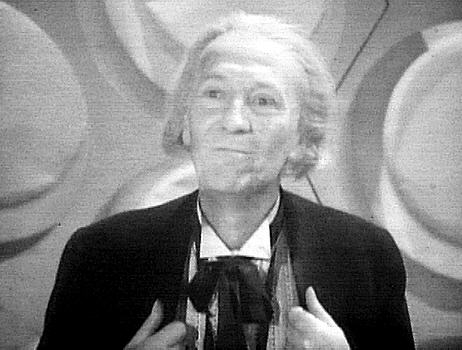 |
| The First Doctor, courtesy of Doctor Who Image Archive. |
The show was, of course, Doctor Who, which is the story of a Time Lord who can travel anywhere in time and space in the police box, which is actually a T.A.R.D.I.S (Time And Relative Dimension in Space). The TARDIS makes a whooshing noise, a little like a plunger and water rushing through pipes. To those who dub themselves "Whovians" it is one of the most magical sounds in the world.
I became a fan of Who a few years ago, when my friend Kelly went through one of those obsessive chains of fandom that geeks go through - we pity those who don't have the experience of fandom. (If anyone is wondering, the chain went like this: I turned her onto Buffy the Vampire Slayer, which led to being a fan of James Marsters > Torchwood > Who.) Who is ostensibly a show for children; British urban legend speaks of kids in the 60's hiding behind their sofas because of the scary monsters on Who.
It is a very British show. In America, Superman ducks into a phone booth and comes out ready to put his strength and power to use; in Britain, The Doctor ducks into a phone booth and comes out with a good idea. American heroes have muscles, The Doctor has a fez. In the words of Craig Ferguson, Doctor Who is, at its heart, a show about the triumph of "intellect and romance over brute force and cynicism."
In a world that seems to be overrun with brute force and cynicism, that kind of message is welcome. But the story is not one that shies away from harder truths - if it was, there would be no need to hide behind sofas. The Doctor is a warrior who lost everything in a terrible battle, and his greatest enemies are cold and emotionless. Most of the show's plots go like this:
- The Doctor and his companion land the TARDIS somewhere in space and time; usually they are planning on having a fascinating time but to stay out of trouble.
- Trouble arrives.
- Everyone runs around.
- Things look dire.
- The Doctor thinks of a clever idea to save the day.
- He gives his enemies the chance to turn away from their destruction.
- They scoff at him and refuse to turn back.
- He defeats them, using sciencey jargon and a tool called the sonic screwdriver.
 |
| The Doctor was played by many actors; Time Lords can regenerate when near death, but they take a new form, leaving room for a new actor. This is the Tenth, David Tennant. Courtesy of the Doctor Who Image Archive |
Those who travel with The Doctor (he has a series of companions; most are young women but they also include an omnisexual space captain, a married couple, and a Scottish Highlander, to name a few) become better versions of themselves. Although no one is allowed to travel with him forever, during the time that they do, they learn what it means to fight for what's right, to stand by your friends, and to maintain a sense of childlike wonder in the face of a universe that is vaster than they can comprehend. To comprehend that universe, as a few companions have found, strips one of her basic humanity and that comprehension must be forgotten.
We need a story like The Doctor's the way we need Santa Claus: to weave a narrative that shows us, like The Doctor shows his companions, that there are higher and finer things than those we might see in our daily lives, to give us a glimpse of a world that we will never quite attain. C.S. Lewis called the emotion evoked by these kinds of stories joy. He did not mean happiness. Instead, he meant "an unsatisfied desire which is itself more desirable than any other satisfaction." Children can hide behind their sofas and long for the whooshing sound of the TARDIS's engines, but they will never hear that sound in their own gardens. It's better that they don't. The longing is what keeps our imaginations humming in time with those engines, sparking us to strive to create the world our better selves would wish for.

1 comment:
Wonderful post! It brought to mind my recent blog onbest jungle safari in india, where I shared some thoughts that align with what you've written here. I believe your readers would enjoy the additional perspectives. Thanks for sharing!
Post a Comment